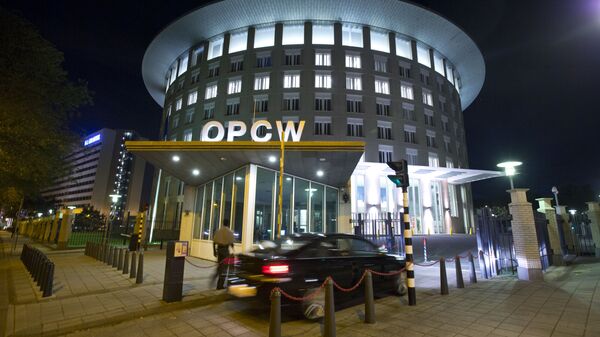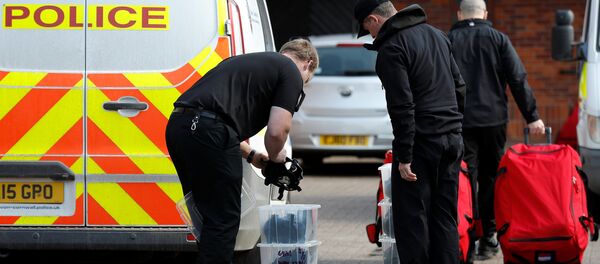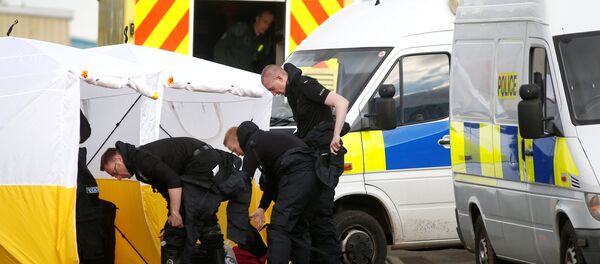Earlier in the day, the OPCW Director-General Ahmet Uzumcu said in his address to the organization’s Executive Council that the results of the analysis of the samples its experts collected in Salisbury at London's request would be available by early next week. The OPCW will subsequently write a report on the analysis results and share it with the United Kingdom.
READ MORE: Skripal Crisis: Spain Unable to Act as Independent State Due to EU – Journalist
The OPCW director-general also noted that the United Kingdom expressed its willingness to disclose the results to other members of the organization.
Uzumcu reiterated in his statement that after arriving in the United Kingdom on March 21, the OPCW experts collected environmental and biomedical samples at the locations where the Skripals had reportedly been exposed. The collected samples were then sealed and brought to the OPCW laboratory on March 23, Uzumcu noted, adding that the United Kingdom was also provided with once split of each sample for its own inquiry in the incident.
Samples Types
Rudy J. Richardson, a professor of Toxicology at University of Michigan, told Sputnik that the so-called Novichok, the substance used to poison the Skripals according to London, is referred to as a class of organophosphorus (OP) nerve agents. The mode of action of Novichok agents is the same as that of other OP nerve agents — namely, inhibition of acetylcholinesterase (AChE) in the nervous system, the expert also assumed.
"If chemists have access to the intact parent compound(s) that was/were used, it should be possible with modern analytical methods to determine the structure(s). If, however, they are relying on analysis of the chemical adducts that are formed on AChE and found in the victims, the chemical groups that would form a recognizable ‘signature’ of a specific nerve agent would have been expelled from the molecule, leaving only a relatively nonspecific chemical entity that could have arisen from a variety of nerve agents," Richardson said.
Russian officials have repeatedly said that the chemical formula of the Novichok military-grade nerve agent had been published online, and had been circulating in various printed media.
On Wednesday, the OPCW is holding an emergency meeting in the Hague on the Skripal case upon Russia’s request. Russian President Vladimir Putin said on Tuesday that Moscow had prepared at least 20 questions over the Skripal poisoning case to raise at the upcoming OPCW emergency meeting.
Alastair Hay, a professor of environmental toxicology at the University of Leeds, suggested that Moscow would get some answers to its questions posed to the OPCW but the organization’s inquiry is unlikely to be completed until next week.
"I hope after some, perhaps heated comments, there will be a free and frank discussion with both Russia and the UK saying what they know about Novichoks. I also hope both sides recognize the value and independence of the OPCW. Both the UK and Russia agreed on how the OPCW would carry out its work. The OPCW is a neutral broker and I hope that role will be supported," Hay told Sputnik.
Ralf Trapp, the former secretary of the Scientific Advisory Board of the OPCW, expressed hope, too, that the organization’s emergency meeting would contribute to finding "a cooperative way forward to clarifying what actually happened, and for ensuring full compliance with the obligations undertaken under the Chemical Weapons Convention."
"The OPCW can provide a framework for such consultations and any clarifications necessary to this end — it will be up to the States Parties to decide how they are going to use this framework," Trapp told Sputnik.
On Tuesday, Gary Aitkenhead, the chief executive of the Defence Science and Technology Laboratory (DSTL) at the UK Porton Down said that the lab had identified the substance used to poison the Skripals as a Novichok military-grade nerve agent, but could not prove that it was made in Russia or determine its country of origin.
READ MORE: Skripal Poisoning: 'UK Could End Up Looking Very Foolish' – Former Guernsey MP
Trapp said that identification of the substance used in the attack on the Skripals as Novichok by the Porton Down was significant in itself, since the number of countries and laboratories having knowledge about this substance is limited, and "Russia is known to have worked towards weaponization of these novel agents."
"The identification of the agent itself of course does not prove its origin; other evidence (both chemical and other forensic evidence) is required to make such an attribution," Trapp pointed out.
Trapp also suggested that since the very beginning, when the United Kingdom started voicing its accusations against Moscow, it has been clear that London’s claims were not limited to the identification of the substance used in the poisoning of the Skripals.
Yulia Skripal Recovery
Porton Down’s Aitkenhead said on Tuesday that the substance which had been used in the attack on the Skripals was extremely toxic, adding that there was no antidote which can be used to negate its effects.
READ MORE: Russia's Permanent Envoy to OPCW Speaks on Skripal Poisoning Meeting
Asked if the fact that Yulia Skripal’s medical state had significantly improved last week casts doubt over claims that Novichok was used against her and her father, Trapp said that this fact did not put the Powton Down lab’s findings into question.
"Even without a specific antidote, poisoning — even with a supertoxic agents — can be treated if measures to stabilize and support the life functions of the victim(s) are initiated in time, and of course it depends on the dose that the victim(s) have received and on their health status (including age and overall medical status). Recovery does not, however, preclude the possibility of delayed or long-term damage," Trapp explained.
Hay, when asked the same question, said he was not sure what Aitkenhead meant.
"We are unlikely to know more until we find out how the Skripals were treated. What [Aitkenhead] may be referring to is a drug called an oxime which is specific for nerve agents and which complexes with the nerve agent and pulls the chemical off the enzyme it is inhibiting. The inhibition blocks messages from nerves to muscles and causes muscle spasm and this can block breathing," Hay noted.
It is unknown which oxime could work for mitigating the effects of the substances of the Novichok family, the researcher noted. Hay suggested however that there were other more general treatments which had almost certainly been used for treating the Skripals.
READ MORE: UK Refused to Provide Russia Samples of Nerve Agent Used to Poison Skripal
Richardson, in his turn, noted that it was important to differentiate between definitions of the word antidote.
"Some definitions indicate that an antidote exerts a neutralizing action that is highly specific for a particular toxic substance. By this definition, there are very few true antidotes for any poison. Other definitions refer to antidotes as any drug that can counteract the effects of a poison. Some would say that this latter definition would more appropriately be termed ‘treatment(s)’ rather than true antidotes," Richardson stated.
If it is assumed that the mode of action of the substance used to poison the Skripals is the same as the that of other nerve agents, then the treatments which are used to negate the effects of nerve agents could be used to treat the Skripals, Richardson pointed out.
Views and opinions expressed in this article are those of the contributors and do not necessarily reflect those of Sputnik.





